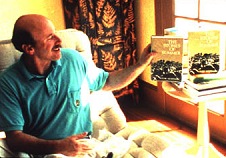![[Deep Focus]](../../flicker/longo.gif)

Even his stories have stories.
![[Deep Focus]](../../flicker/longo.gif)
|
|
| Stone Reader
|
|

|
|
Even his stories have stories. |
|
|
Movie Credits: Written and directed by Mark Moskowitz Cinematography by Moskowitz, Jeff Confer and Joe Vandergast Edited by Moskowitz and Kathleen Soulliere USA, 2002 Theatrical aspect ratio: 1.85:1 Screened at Burns Film Center, Pleasantville, NY Playdates are listed at the official Web site. |
Mike Moskowitz leveraged a love of books and a knack for earnest, persuasive filmmaking (he directs political campaign ads) to create this documentary yarn, which ostensibly tracks his efforts at locating the forgotten author of a favorite novel but has aspirations to celebrate avid reading habits across multiple lifetimes. Moskowitz offers a whirlwind introduction to The Stones of Summer, a first novel by a writer named Dow Mossman. It's a book that he picked up as a lad after critic John Seelye gave it a rave review in The New York Times, but he couldn't get into it at the time. Some 25 years later, he dove into his aging, disintegrating paperback edition and found it enthralling. An Internet search turning up basically zero data on the author - other than links to purchase used copies of the hardcover - Mossman did what any dedicated reader would: he hired a cameraman and hit the road to find out what happened to the writer. With stops in Florida, New York City, Colorado Springs, and finally Mossman's old stomping grounds in Iowa, Moskowtiz corrals an impressive line up of literary semi-celebs and has them hold forth on Mossman, first novels, and the unique properties of the written word. As investigative journalism, it's engaging if long-winded. As personal memoir, a story of men and the books that bind them, it's fairly complex but verges on maudlin. And as the story of a book, it's surprisingly uninterested in actually tackling the novel in question. The opening page appears on screen long enough for a careful viewer to get most of the gist of the first paragraph, which is engaging enough. But precious little sense is given of what else the 600-page book contains, or why our protagonist found it to be so remarkable. That's forgivable, I think. What Moskowitz is after isn't so much the story of a book as it is the story of the book's reader, the bred-in-the-bone stone reader. He's trusting viewers to project their own relationships with a favorite book onto his. Because, in the tradition of personal documentaries, Stone Reader is the story of nothing so much as its maker. In that, it's a qualified success. (And I'm not ashamed to say that I give him bonus points for shooting on film rather than DV.) Moskowitz has a bit of Michael Moore in him. He's an ordinary-looking joe with a devotion to literature. And Moskowitz does manage to work up some anticipation, some genuine suspense, on the question of whether or not he'll actually come face to face with the author for whom he quests. To get there, he plays fast and loose with the notion of nonfiction filmmaking. Some shots are clearly staged, and by the end of the movie it seems like he's deliberately stalling his own investigation - how hard can it be to take a trip to the man's home state and start asking around at his alma mater? - for dramatic purposes. This showboating starts to wear thin as the movie wears on. (No wonder this guy works in politics.) Lucky for him, he does squeeze some juice out of the situation. One conversation among many is with Joseph Heller's editor at Knopf about Catch 22, and its flaccid successor Something Happened. It conveys something of the excitement of literary discovery and the deeply personal nature of one's reading of a books. And his fond discussions with the late literary critic Leslie Fiedler, though they come up empty on the subject of Mossman himself, are lively with an infectious enthusiasm for the very act of critical reading. (Alas, Fiedler died shortly after the film premiered.) But Moskowitz is after something else. He's reaching to make a personal statement that occasionally, and unfortunately, turns gloppy with sentiment. Stone Reader tries to depict a sort of circular relationship among multiple lives touched by literature - the writer and the reader, the critic and the layman, the professor and the student, and (maybe the big one) the father and the son. The pensive filmed portraits of Mike's kid riding a ferris wheel and chatting with interview subjects are supposed to convey something of the passion for literature that's shared between big and little men. In the final reel of the film, we see the kid grinning as he unwraps an Amazon.com package containing the new Harry Potter hardcover. For a minute, I felt as though the film were being shown in Super 8, and I was the captive of some host who had dimmed the lights and held me captive to his home movies. But are some misgivings in evidence here? What does it mean to the culture of books and literature that bibliophiles now get their fix almost exclusively by mail order, their treasure flying under the banner of a giant retail corporation rather than a musty old used book store stacked from floor to ceiling with them? And how different a world does the multimillionaire J.K. Rowling live in from the one that seems to have swallowed Dow Mossman, or at least his ambitions, whole? |
 http://www.deep-focus.com/flicker/
bryant@deep-focus.com
http://www.deep-focus.com/flicker/
bryant@deep-focus.com